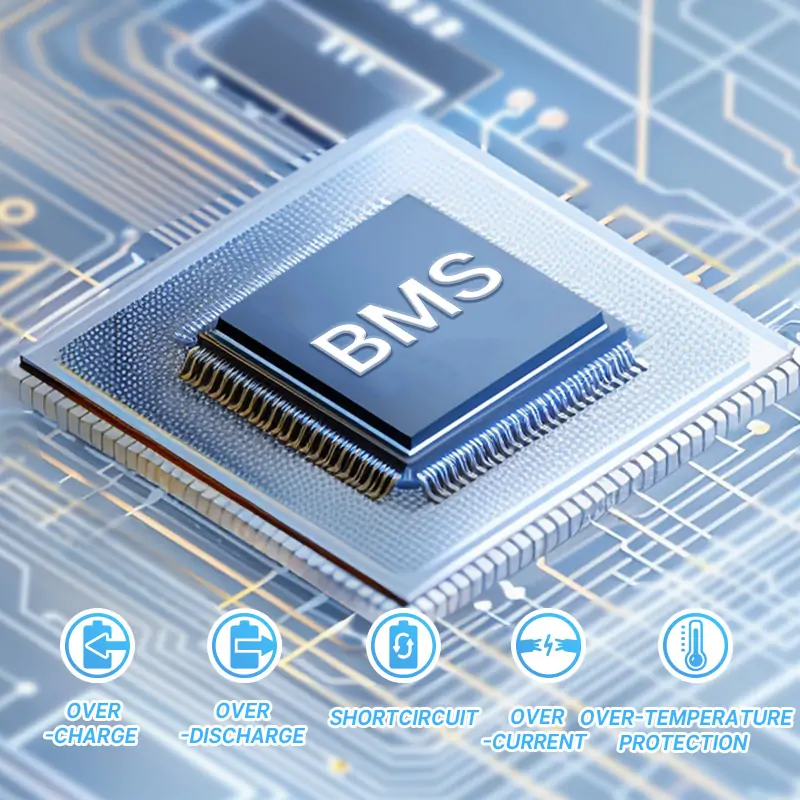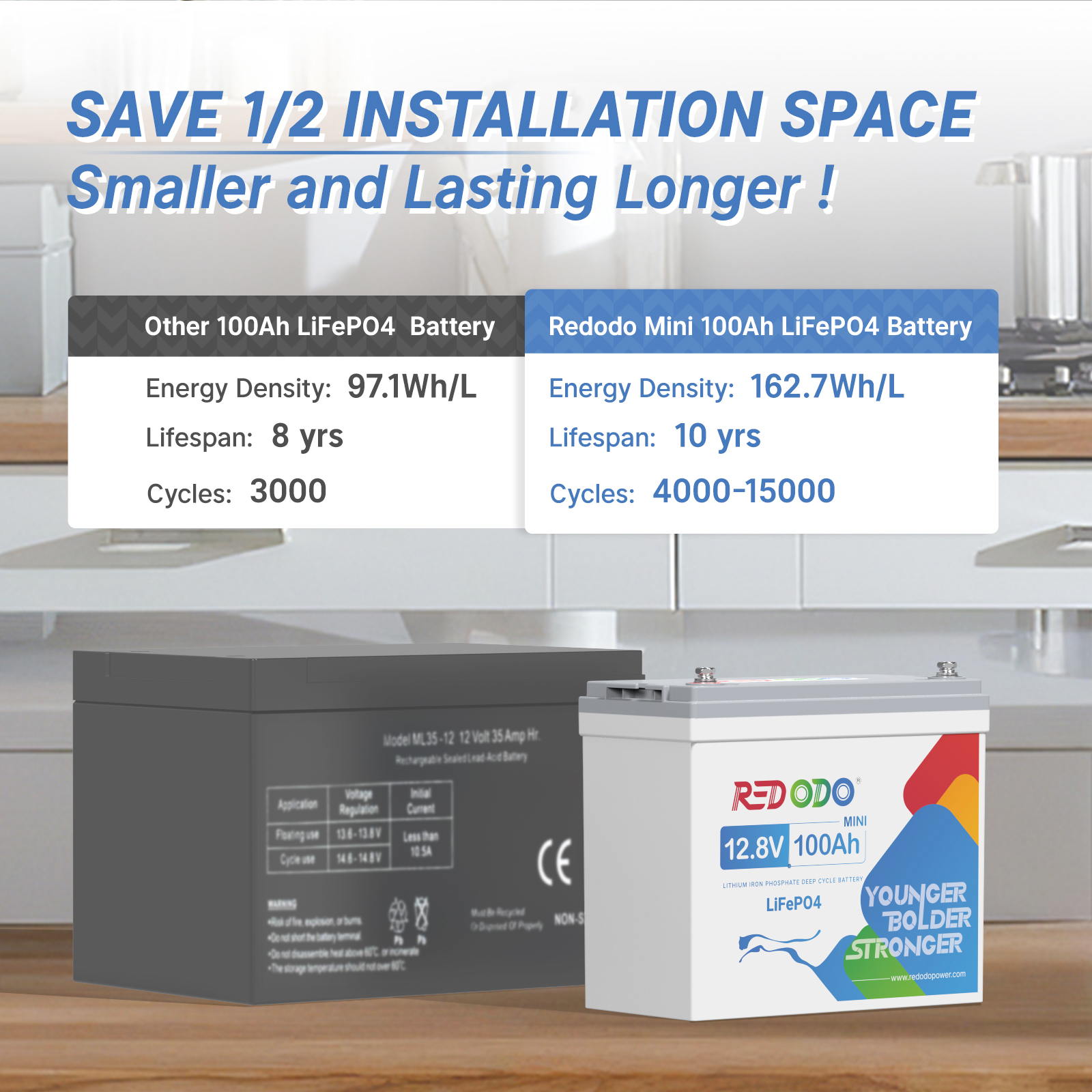For decades, lead acid batteries have been widely used as deep cycle batteries. However, in recent years, there has been a growing trend of replacing traditional lead acid batteries with LiFePO4 batteries. So, what are the differences between these two types of batteries and why is the LiFePO4 battery a better choice? Dive in to have a comprehensive guide on lifepo4 vs lead acid.
What is A Lead-Acid Battery?
A lead-acid battery is a type of rechargeable battery that uses lead plates and sulfuric acid as its electrolyte. It is one of the oldest and most established types of rechargeable batteries and has been widely used in various applications.
Lead-acid batteries consist of several cells connected in series to provide the desired voltage. Each cell contains lead plates, one coated with lead dioxide (positive electrode) and the other with pure lead (negative electrode). These plates are immersed in a sulfuric acid solution, which acts as the electrolyte.
During the discharge process, the sulfuric acid reacts with the lead plates, producing lead sulfate and releasing electrical energy. When the battery is recharged, the reaction is reversed and lead sulfate is converted back into lead and lead dioxide, while the sulfuric acid is restored.

Pros of Lead-Acid Batteries
- Affordable: Lead acid batteries are typically more cost-effective compared to other types of batteries.
- Suitable for high-power applications: They have the ability to deliver high surge currents, making them suitable for applications that require brief bursts of high-power, such as starting boat engines.
Cons of Lead-Acid Batteries
- Low energy density: Compared to lithium-ion batteries and other types, lead acid batteries have a relatively low energy density, meaning they store less energy per unit of weight.
- Limited cycle life: Lead acid batteries can only withstand a limited number of charge-discharge cycles around 300-500 (1-3 years lifespan) before their capacity starts to diminish significantly.
- Ventilation requirements: When charging, lead acid batteries release hydrogen gas, which can be potentially hazardous if not properly ventilated.
- Risk of acid leakage: Improper handling, damage, or defects can result in acid leakage from lead acid batteries, which can be corrosive and harmful to the environment.
- Regular maintenance needed: Lead acid batteries require regular maintenance to ensure optimal performance and longevity. This includes monitoring electrolyte levels, maintaining proper charging voltage, equalizing charges periodically, and cleaning terminals to prevent corrosion.
What is A LiFePO4 Battery?
LiFePO4 stands for Lithium Iron Phosphate, which is a type of rechargeable li-ion battery chemistry. This battery chemistry is targeted for use in power tools, electric vehicles, solar energy installations and more recently large grid-scale energy storage.
Pros of LiFePO4 Battery - Why It Better?
Long Lifespan
In comparison to other lithium-ion technologies and lead-acid batteries, LiFePO4 (LFP) batteries have a significantly longer lifespan, which can handle 2,500 to 5,000 charge and discharge cycles before experiencing around a 20% decrease in capacity. Advanced options like the Redodo LiFePO4 battery can even exceed this range, lasting through 4,000 to 15,000 life cycles (4000+ cycles @100% DOD (6000 Cycles @80% DOD, 15000 Cycles @60% DOD).
Each time you discharge and recharge a battery, it counts as one cycle. Under normal operating conditions, Redodo's LiFePO4 batteries can endure for ten years or more.
On the other hand, a typical lead-acid battery usually provides only a few hundred cycles before experiencing a decline in capacity and efficiency. This results in frequent replacements, leading to wastage of both time and money for the owner and contributing to electronic waste.
Furthermore, lead-acid batteries typically demand significant maintenance to ensure optimal performance.
High Energy Density
LiFePO4 batteries offer a superior energy density, enabling them to store more power in a smaller space compared to other battery chemistries. This advantage makes them ideal for portable solar generators, as they are lighter and more compact than lead-acid and traditional lithium-ion batteries.
Moreover, the high energy density of LiFePO4 batteries is increasingly attracting the attention of electric vehicle (EV) manufacturers. By storing more power in a smaller footprint, LiFePO4 batteries are becoming the preferred choice for EVs, as they maximize power storage while minimizing the valuable space requirements.
Because of its high energy density, Redodo 12V 100Ah Mini LiFePO4 batteries weights only 19 lbs.
Safety
LiFePO4 batteries have excellent thermal stability, which means they are less likely to overheat or catch fire, even under extreme conditions. This is due to the battery's stable molecular structure and the absence of volatile electrolyte materials.
LiFePO4 batteries use a non-flammable electrolyte, typically composed of a lithium salt in an organic solvent. This electrolyte is much less reactive and poses a lower risk of thermal runaway or leakage in case of damage.
What’s more, LiFePO4 battery has built-in BMS (battery management system) to protect the battery from over-charge, over-current, over discharge, over-voltage, short-circuit and high temperature.

Low Self-Discharge Rate
LiFePO4 batteries have extremely low self-discharge rates, which means they can retain their charge for longer periods of time when not in use. LiFePO4 battery’s self-discharge rate is 1%-3% per month, while lead acid battery is around 5% per month.
The graph below compares the self-discharge rates of the Redodo LiFePO4 battery (represented by the blue and green lines) with that of other lead acid batteries. It is evident that the Redodo battery maintains a steady self-discharge rate.

Cons of LiFePO4 Battery
The biggest con of LiFePO4 batteries is their higher initial cost. Redodo provides best-budget LiFePO4 battery with grade-A cell, helping your solar system’s dream comes true!
Check out the best price of Redodo 12V 50Ah LiFePO4 Battery and Redodo 12V 100Ah LiFePO4 Battery now.
LiFePO4 vs. Lead Acid Battery Lifetime Cost
Yes. LiFePO4 batteries has higher initial cost. However, we need to calculate the battery’s lifetime cost to find out weather it is a worthy investment.
To accurately determine the lifetime cost of a battery, it is recommended to estimate the number of charge and discharge cycles it will undergo per year. By multiplying the total number of cycles by the expected lifespan of each battery type, a more accurate calculation can be obtained:
- A premium deep cycle lead-acid battery typically lasts 3-5 years or 600-1,000 cycles.
- An inexpensive deep cycle lead-acid battery generally lasts 2-3 years or 300-400 cycles.
- A high-quality LiFePO4 battery has an average lifespan of more than 10 years or 5,000+ cycles, with some batteries lasting even longer depending on usage.
Note that these figures are estimates based on various sources and assume a 50% depth of discharge.
Comparing the total number of cycles to the estimated lifespan can help determine the limiting factor. From there, dividing the upfront cost by the number of years or cycles can provide the effective cost per year or cost per cycle.
Take 12V 100Ah battery for example. If you use your battery frequently, charging and discharging it twice a day, the calculation of lifetime cost changes significantly. In this scenario, you will likely exhaust the available cycles of the battery before it reaches its maximum lifespan. It means that the number of cycles becomes the limiting factor rather than the age of the battery.
Therefore, it is crucial to consider the cycle life of the battery when assessing its lifetime cost in such situations.
|
Battery |
Up-Front Cost (est.) |
Expected Life |
Cost/Cycle(low est) |
Cost/Cycle(high est.) |
|
Inexpensive Deep Cycle Lead-Acid |
$150 |
300-400 cycles |
$0.38 |
$0.50 |
|
Premium Deep Cycle Lead-Acid |
$319 |
600-1000 cycles |
$0.30 |
$0.50 |
|
$309 |
5000-6000 cycles |
$0.03 |
$0.05 |
LiFePO4 batteries are indeed cost-effective on a per cycle basis. When used daily, they can save you a significant amount of money compared to other battery options.
Conclusion
In summary, the advanced technology of LiFePO4 batteries makes them superior and highly efficient compared to other battery options. Redodo provides best-budget high-quality LiFePO4 deep cycle batteries. Visit our website and learn more reviews about Redodo!
![[Newest] Deep Cycle LiFePO4 vs. Lead Acid Battery](http://www.redodopower.com/cdn/shop/files/Reodod_logo1.jpg?crop=center&format=webp&height=24&v=1730185167&width=24)
Redodo
![[Newest] Deep Cycle LiFePO4 vs. Lead Acid Battery](http://www.redodopower.com/cdn/shop/files/Reodod_logo1.jpg?crop=center&format=webp&height=24&v=1730185167&width=24)
Redodo
Recent Post

How Long Does a Trolling Motor Battery Last?

Convert RV from Lead-Acid to Lithium Battery: A Complete Guide

How Long Will a 200Ah Battery Run an Air Conditioner?

A Full Review of Redodo 12V 140Ah Group 31 Deep Cycle Battery


![⚡[$220 after Sign-Up] Redodo 12V 100Ah Group 24 Deep Cycle LiFePO4 Lithium Battery | For Home, RV, Marine](http://www.redodopower.com/cdn/shop/files/Redodo_12V_100Ah_group_24_lithium_battery_6301965d-f6e8-467f-825f-3eec839b3e1f.jpg?v=1744105344)
![⚡[$220 after Sign-Up] Redodo 12V 100Ah LiFePO4 Lithium Battery | Best Budget | For RV, Solar, Trolling Motor](http://www.redodopower.com/cdn/shop/files/Redodo_12v_100ah_lithium_battery_b9015ddd-64b5-4be2-8c88-392f0bb4ab30.jpg?v=1742973160)
![⚡[$377 after Sign-Up] Redodo 12V 200Ah Lithium LiFePO4 Battery | 1280W Load Power | For RV, Solar, Off-Grid](http://www.redodopower.com/cdn/shop/files/Redodo12V200ahlithiumbattery.jpg?v=1735892910)

![⚡[$450 after Sign-Up] Redodo 12V 280Ah LiFePO4 Battery | Low Temp Protection | For RV, Marine, Solar](http://www.redodopower.com/cdn/shop/files/Redodo12V280AhLowTempCutoffLiFePO4Battery.jpg?v=1741251504)
![⚡[$947 after Sign-Up]Redodo 24V 200Ah LiFePO4 Lithium Battery | Marine, Solar Home, Home Back up](http://www.redodopower.com/cdn/shop/products/24v200ahlithiumbattery-1.jpg?v=1735893113)
![⚡[$294 after Sign-Up] Redodo 12V 140Ah Group 31 Lithium Battery with Bluetooth | 40% More Capacity | For RV, Marine, Solar Home](http://www.redodopower.com/cdn/shop/files/Redodo_12V_140ah_bluetooth_battery_ee6d5fd1-5c7d-4b9a-90ab-d54d06b29a04.jpg?v=1742967763)
![⚡[$524 after Sign-Up] Redodo 12V 300Ah Lithium LiFePO4 Battery | Replaces 6*12V 100Ah AGM Batteries | RV, Marine, Solar](http://www.redodopower.com/cdn/shop/files/Redodo_12V_300ah_lithium_deep_cycle_battery.png?v=1744797523)
![⚡[$947 after Sign-Up] Redodo 12V 410Ah Lithium LiFePO4 Battery | King of Power | Marine, RV, Solar Home](http://www.redodopower.com/cdn/shop/products/Redodo12V400Ahlithiumbattery-1.jpg?v=1736154087)